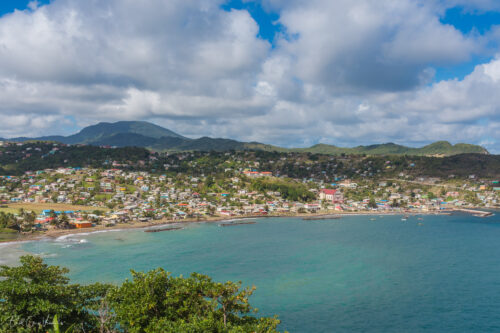Photo Credits: Adane Edmund

Caribbean countries on the frontline of climate change get lasting support to unlock critical finance
Dubai, UAE – December 3, 2023
As international climate negotiations unfold at the annual UN climate conference in Dubai, there is an urgent need for most vulnerable countries, particularly Small Islands Developing States (SIDS) and Least Developed Countries (LDCs) to access climate finance at the speed and scale needed to respond to the worsening climate crisis. Building on the success of mobilizing millions in climate finance in Pacific SIDS since 2021, the Climate Finance Access Network (CFAN) today launched its Caribbean chapter with support from Canada and the United States.
CFAN supplements and builds capacity in SIDS and LDCs by hiring locally and training climate finance advisors to be embedded in governments and Direct Access Entities (DAEs). With initial support from Canada, CFAN launched in the Pacific in 2021 where seven advisors have since unlocked US $64.4 million in climate financing for resilience, while an additional US $463.8 million investment pipeline is under development. Scaling this proven success, CFAN announced at COP28 in the CARICOM pavilion, that the Network is about to deploy seven new advisors in the Caribbean in The Bahamas, Barbados, Grenada, Jamaica, St Lucia, St Vincent and the Grenadines, and at the Caribbean Community Climate Change Centre (CCCCC) in Belize.
“Developing countries are often the hardest hit by extreme weather and other impacts of climate change, despite them contributing the least to the pollution driving climate change. Contributor countries need to live up to their commitments, but those commitments alone aren’t enough if those who need it can’t access financial support. We congratulate CFAN for making huge stride in its efforts to build local capacity, break down barriers and promote equitable access by supporting the launch of the Caribbean chapter. That’s why I am excited to support CFAN with an additional $250,000 on top of our $5M commitment announced at COP27,” says the Honorable Steven Guilbeault, Minister of Environment and Climate Change in Canada.
“Canada has been a partner and supporter of CFAN since our very first days, and enabling our Caribbean expansion is a deeply meaningful extension of our impact,” says Laetitia De Marez, Senior Director of CFAN and RMI’s Islands Energy Program. “We are so proud and delighted to welcome the United States as a CFAN donor, adding their support to the recruiting of the fist cohort of finance advisors in the Caribbean. This truly represents how international collaboration on climate finance access can make a difference in offering practical solutions to address capacity constrains in SIDS.”
In its expansion to the Caribbean and as part of its mission to strengthen capacity of regional DAEs, CFAN will operate in close partnership with the CCCCC, whose hosting of a CFAN advisor will be a critical complement to the work of the six advisors working at the national level.
“Access to climate finance, at the scale and speed required, remains the greatest threat to the pursuit of climate resilient development among SIDS, even though they are at the frontlines of the worsening climate crisis,” says Dr. Colin Young, Executive Director of the CCCCC. “This partnership with CFAN that will embed an climate finance advisor within the CCCCC’S Program and Development Unit will significantly advance our substantial pipeline of projects to increase both the scale and speed of climate finance to build climate resilience in CARICOM Member States and positively impact the lives and livelihood of our people.”
CFAN’s first Caribbean advisor has been active in St. Lucia since July 2023 thanks to the support of the Open Society Foundation. Skeeta Carasco, a Lucian national with a background at the National Utilities Regulatory Commission, is actively developing a cross-cutting multi-million-dollar pipeline of projects in St Lucia, and shared her insights on her experience during the launch event at COP28.
“CFAN has allowed me to connect the dots between critical infrastructure work, climate resilience, and the needs of communities,” Carasco says. “I am now in the best position to make a difference, because finance is the biggest challenge that Caribbean countries and SIDS face.” To the six advisors who will be joining her in the region, she says, “We have been given the opportunity of a lifetime to contribute meaningfully to making the Caribbean climate-smart and resilient. I’m looking forward to embarking on the training program with my fellow advisors and to start building our climate finance community of practice.”
More information on the work being done by CFAN advisors in the Pacific and the Caribbean can be found at https://cfanadvisors.org/where-we-work/
For press inquiries, please contact Denali Hussin, dhussin@rmi.org
The Climate Finance Access Network (CFAN) is an agile, demand-driven initiative that offers a practical and actionable solution to developing countries facing capacity constraints in accessing climate finance. The network is hosted by RMI, an independent, non-partisan, nonprofit organization. Follow CFAN on LinkedIn and Twitter, and learn more at https://cfanadvisors.org/.
Environment and Climate Change Canada: Protecting and conserving our natural heritage, predicting weather and environmental conditions, preventing and managing pollution, promoting clean growth and a sustainable environment for present and future generations.
The mission of the United States Department of State is to protect and promote U.S. security, prosperity, and democratic values and shape an international environment in which all Americans can thrive.
The Caribbean Community Climate Change Centre (CCCCC) is mandated by Heads of Governments of the Caribbean Community (CARICOM) to coordinate the region’s response to climate change. Officially opened in August 2005, the CCCCC is the key node for information on climate change issues and the region’s response to managing and adapting to climate change. It maintains the largest repository of Caribbean-specific climate change information and data in its Regional Clearing House and it provides climate change-related policy advice and guidelines to the CARICOM Member States. The CCCCC serves as an Accredited Entity to both the Green Climate Fund and the Adaptation Fund as, as such, assist CARICOM Member States to mobilize climate finance to pursue climate resilient development.